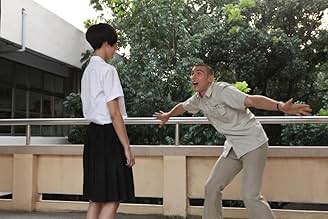ÉVALUATION IMDb
7,0/10
2,2 k
MA NOTE
Ajouter une intrigue dans votre langueWhen three rebellious students leave their hometown to pursue their lifelong dreams in the big city, their relationships start to face the pressures of real life as the 1980s Taiwanese socio... Tout lireWhen three rebellious students leave their hometown to pursue their lifelong dreams in the big city, their relationships start to face the pressures of real life as the 1980s Taiwanese socio-political reformation movement unfolds in the background.When three rebellious students leave their hometown to pursue their lifelong dreams in the big city, their relationships start to face the pressures of real life as the 1980s Taiwanese socio-political reformation movement unfolds in the background.
- Prix
- 8 victoires et 25 nominations au total
Hsiao-chuan Chang
- Liam
- (as Joseph Chang)
Nai-Hua Lin
- Liam's Mother
- (as Nai-Hua Chiu)
J.C. Lei
- Younger Twin Sister - 2012
- (as Hsiao-Lan Chang)
Avis en vedette
"GF*BF" is one of those tragic life experiences disguised within layers of a coming of age kind of youthful romance, but really it is a deep and complicated emotional turmoil about three tragic souls growing up in Taiwan during the 80s period of immense social change.
"GF*BF" is an immensely difficult film to review, as it is one of those films that is impossible to dislike. It is well directed, stylishly filmed, complicatedly and originally scripted, filled with some truly wonderful and convincing performances, but somehow, it doesn't totally go the distance. In saying so, director Yang Ya-che does a wonderful job in bringing such a complicated and layered script to life and almost pulled it off convincingly. In fact, there are times when I was almost overwhelmed by the volume of feelings and emotions on display, but somehow the film lacks a resonance emotional connection with the audience that could have propel the film to reach its lofty ambitions. Not unlike 2006′s Taiwanese youth romance "Eternal Summer" (also starring lead actor Joseph Chang), the film deals with similar issues and situated during a testing period of time in Taiwan and for youth growing up in general.
In many ways the film attempts to say too much, striving to be far too complex and by the end of it, the film itself is caught within its own web. There is just so much potential that director Yang could've explored, but somehow fails to fully capitalize on it. In fact, some scenes are so powerful and notable, namely the intense confrontation scene at the karaoke room, the simple good bye gesture from Gwei Lun Mei looking on by the bedroom window and the brilliant scene at the airport near the end. At times, the quality from these scenes feels as though it came from a different movie all together. However, a few scenes do not make a movie and instead of uplifting the audience to the ultimate emotional connection, the film decides to cut and chop to another time period.
Joseph Chang ("Eternal Summer") at times is able to even outshine the always brilliant Gwei Lun Mei ("Secret"). Chang is quietly wonderful in the conflicted role and carries the film with the most difficult character on hand. Rhydian Vaughan ("Love 2012") tries hard, but is given far too little material to work with, other than being a total jerk. In a way, Gwei Lun Mei is fast becoming the Taiwanese's version of Zhou Xun and that's the highest order of compliment an Asian actress can receive in this day and age. Her chemistry with Chang is undeniable and the subtle moments between the two are best left in the unspoken scenes of early tiny touches, wandering eyes and some stirring emotions. What director Yang is able to achieve is being able to create and allow the audience to focus on the two main characters (Gwei Lun Mei and Joseph Chang) that in more than one ways or another are clearly two complete mirror images of each other.
At the end of the day, Yang tries extremely hard to convince the audience about the subject matter that he is trying to say. While there are notions of life, love and friendship that one can possibly learn from or even relate, the film seems more occupy with the twists and turns of complexity into the dynamics of the trio relationships than actual cinematic experience for the audience. With that being said, "GF*BF" is easily a good film, filled with some truly wonderful performances, helmed by an ambitious director and illuminated by a difficult period of change in Taiwanese history. One just cannot help compare the similarities with 2006's "Eternal Summer", but of the two films, there is no doubt that Yang takes it much further. A good film that comes up short of its lofty ambitions (Neo 2012)
I rate it 8/10
"GF*BF" is an immensely difficult film to review, as it is one of those films that is impossible to dislike. It is well directed, stylishly filmed, complicatedly and originally scripted, filled with some truly wonderful and convincing performances, but somehow, it doesn't totally go the distance. In saying so, director Yang Ya-che does a wonderful job in bringing such a complicated and layered script to life and almost pulled it off convincingly. In fact, there are times when I was almost overwhelmed by the volume of feelings and emotions on display, but somehow the film lacks a resonance emotional connection with the audience that could have propel the film to reach its lofty ambitions. Not unlike 2006′s Taiwanese youth romance "Eternal Summer" (also starring lead actor Joseph Chang), the film deals with similar issues and situated during a testing period of time in Taiwan and for youth growing up in general.
In many ways the film attempts to say too much, striving to be far too complex and by the end of it, the film itself is caught within its own web. There is just so much potential that director Yang could've explored, but somehow fails to fully capitalize on it. In fact, some scenes are so powerful and notable, namely the intense confrontation scene at the karaoke room, the simple good bye gesture from Gwei Lun Mei looking on by the bedroom window and the brilliant scene at the airport near the end. At times, the quality from these scenes feels as though it came from a different movie all together. However, a few scenes do not make a movie and instead of uplifting the audience to the ultimate emotional connection, the film decides to cut and chop to another time period.
Joseph Chang ("Eternal Summer") at times is able to even outshine the always brilliant Gwei Lun Mei ("Secret"). Chang is quietly wonderful in the conflicted role and carries the film with the most difficult character on hand. Rhydian Vaughan ("Love 2012") tries hard, but is given far too little material to work with, other than being a total jerk. In a way, Gwei Lun Mei is fast becoming the Taiwanese's version of Zhou Xun and that's the highest order of compliment an Asian actress can receive in this day and age. Her chemistry with Chang is undeniable and the subtle moments between the two are best left in the unspoken scenes of early tiny touches, wandering eyes and some stirring emotions. What director Yang is able to achieve is being able to create and allow the audience to focus on the two main characters (Gwei Lun Mei and Joseph Chang) that in more than one ways or another are clearly two complete mirror images of each other.
At the end of the day, Yang tries extremely hard to convince the audience about the subject matter that he is trying to say. While there are notions of life, love and friendship that one can possibly learn from or even relate, the film seems more occupy with the twists and turns of complexity into the dynamics of the trio relationships than actual cinematic experience for the audience. With that being said, "GF*BF" is easily a good film, filled with some truly wonderful performances, helmed by an ambitious director and illuminated by a difficult period of change in Taiwanese history. One just cannot help compare the similarities with 2006's "Eternal Summer", but of the two films, there is no doubt that Yang takes it much further. A good film that comes up short of its lofty ambitions (Neo 2012)
I rate it 8/10
You should really go with your Asian friend.
This is the best Taiwanese movie i have ever seen, which talks about love.
The way it presents the story is so romantic, that you will literally fall in love with the movie.
Main actors and actress are so cute, their acting is natural, sentimental, and tear-alluring.
I really hope more and more MADE IN TAIWAN can find its market in the U.S., there are so many people here who appreciates Taiwanese products, especially their amazing movies.
Love it
This is the best Taiwanese movie i have ever seen, which talks about love.
The way it presents the story is so romantic, that you will literally fall in love with the movie.
Main actors and actress are so cute, their acting is natural, sentimental, and tear-alluring.
I really hope more and more MADE IN TAIWAN can find its market in the U.S., there are so many people here who appreciates Taiwanese products, especially their amazing movies.
Love it
Those clued in to Taiwan's much-hyped cinematic wave and new generation of auteurs will find Ya-che Yang's new work familiar ground.
A blend of coming-of-age realities and a fair dose of human drama, it's a formula that has been shown to work wonders.
Moderation, however, is often shown to be the achilles heel when following such proved plot formulas. And while the film touches many a raw soul rooted in the conundrums of unrequited love, it is also perhaps where Girlfriend Boyfriend flatters to deceive.
Set against Taiwan's political wave of student uprisings in 1985, Girlfriend Boyfriend is a film about three school students coming to grips with their sexualities and self-consciousness.
Sean (Shu-Hao Chang), Liam (Hsiao-chuan Chang) and Mabel (Lunmei Kwai) are best friends who are bonded by the anti-establishment ideology of the time.
Each brings a different element and perspective but all three pieces fit into a perfect team picture of revolutionary prodigies staking their places in society.
Of course, the adrenalin-charging environment of the times can only raise the levels of raging teenage hormones, and the viewer is slowly thrown to question whether their friendship is defined by bonds, or by their own love agendas.
In giving each of his three leading characters a distinctive unyielding persona, Ya-che Yang sets the development of his characters in a natural motion as the years pass.
While the consistency helps the viewer take a liking to them and their unconventional ideologies, it also surfaces a rigidity that extends to their love interests. And that, while stemmed in the film's main theme, is also what this critic felt was overscripted to the point of tiresome blabber.
All in all, the viewer leaves the theatre sharing the sense of resignation to life's conundrums the film's three lead characters convey through their complicated characters at some time or another.
The great Oscar Wilde penned "Life imitates Art far more than Art imitates Life"
If it was pertaining to Girlfriend Boyfriend (2012), it might make sense to put away the tissue box readied for Hollywood-esque heart-rending moments, and bring a state of human consciousness into the theatre.
A blend of coming-of-age realities and a fair dose of human drama, it's a formula that has been shown to work wonders.
Moderation, however, is often shown to be the achilles heel when following such proved plot formulas. And while the film touches many a raw soul rooted in the conundrums of unrequited love, it is also perhaps where Girlfriend Boyfriend flatters to deceive.
Set against Taiwan's political wave of student uprisings in 1985, Girlfriend Boyfriend is a film about three school students coming to grips with their sexualities and self-consciousness.
Sean (Shu-Hao Chang), Liam (Hsiao-chuan Chang) and Mabel (Lunmei Kwai) are best friends who are bonded by the anti-establishment ideology of the time.
Each brings a different element and perspective but all three pieces fit into a perfect team picture of revolutionary prodigies staking their places in society.
Of course, the adrenalin-charging environment of the times can only raise the levels of raging teenage hormones, and the viewer is slowly thrown to question whether their friendship is defined by bonds, or by their own love agendas.
In giving each of his three leading characters a distinctive unyielding persona, Ya-che Yang sets the development of his characters in a natural motion as the years pass.
While the consistency helps the viewer take a liking to them and their unconventional ideologies, it also surfaces a rigidity that extends to their love interests. And that, while stemmed in the film's main theme, is also what this critic felt was overscripted to the point of tiresome blabber.
All in all, the viewer leaves the theatre sharing the sense of resignation to life's conundrums the film's three lead characters convey through their complicated characters at some time or another.
The great Oscar Wilde penned "Life imitates Art far more than Art imitates Life"
If it was pertaining to Girlfriend Boyfriend (2012), it might make sense to put away the tissue box readied for Hollywood-esque heart-rending moments, and bring a state of human consciousness into the theatre.
8tpsn
I don't speak Mandarin but thoroughly enjoys this film. High recommended for anyone who is interested in foreign film!
10clinluo
She loves him! he loves him! If the relationship is not established when time is not established, we are not willing to endure hardships for anyone, we are just asking for hardship. No matter how much we fall in love, we can't stand the most primitive cold of the world. Love is bigger than being loved, we are all Meibao, we are all Ah Liang, we believe in love and suffering for love, and later surrendered to become a good medicine. Magnolia floated by, things have changed.
Le saviez-vous
- ConnexionsReferences Casablanca (1942)
Meilleurs choix
Connectez-vous pour évaluer et surveiller les recommandations personnalisées
- How long is Girlfriend Boyfriend?Propulsé par Alexa
Détails
Box-office
- Brut – États-Unis et Canada
- 64 414 $ US
- Fin de semaine d'ouverture – États-Unis et Canada
- 29 016 $ US
- 5 août 2012
- Brut – à l'échelle mondiale
- 667 626 $ US
- Durée1 heure 46 minutes
- Couleur
- Rapport de forme
- 2.35 : 1
Contribuer à cette page
Suggérer une modification ou ajouter du contenu manquant



















